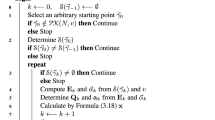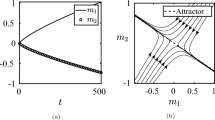Abstract
This paper argues that Nash equilibrium is a solution where all strategic uncertainty has been resolved and, therefore, inappropriate to model situations that involve “ambiguity.” Instead, to capture what players will do in the presence of some strategic uncertainty, takes a solution concept that is closed under best replies. It is shown that such a solution concept, fixed sets under the best reply correspondence, exists for a class of games significantly wider than those games for which generalizations of Nash equilibrium exist. In particular, this solution can do without the expected utility hypothesis.
Similar content being viewed by others
References
Aliprantis C.D., Border K.C.: Infinite Dimensional Analysis (3rd edn.; 1st edn. 1999). Springer, Berlin (2006)
Allais M.: Le comportement de l’homme rationnel devant le risque, critique des postulats et axiomes de l’école Américaine. Econometrica 21, 503–546 (1953)
Aumann R.J.: Mixed and behavior strategies in infinite extensive games. In: Dresher, M., Shapley, L.S., Tucker, A.W. (eds) Advances in Game Theory, Annals of Mathematics Study 52, pp. 627–650. Princeton University Press, Princeton (1964)
Aumann R.J., Brandenburger A.: Epistemic conditions for Nash equilibrium. Econometrica 63, 1161–1180 (1995)
Ausubel L.M., Deneckere R.J.: A generalized theorem of the maximum. Econ Theory 3, 99–107 (1993)
Basu K., Weibull J.W.: Strategy subsets closed under rational behavior. Econ Lett 36, 114–146 (1991)
Berge C.: Topological Spaces. Oliver & Boyd, Edinburgh and London (1963)
Bernheim B.D.: Rationalizable strategic behavior. Econometrica 52, 1007–1028 (1984)
Chateauneuf A., Eichberger J., Grant S.: Choice under uncertainty with the best and worst in mind: neo-additive capacities. J Econ Theory 137, 538–567 (2007)
Cohen M.: Security level, potential level, expected utility: a three-criteria decision model under risk. Theory Decis 33, 101–134 (1992)
Crawford V.P.: Equilibrium without independence. J Econ Theory 50, 127–154 (1990)
Dow J., Werlang S.R.C.: Nash equilibrium under uncertainty: breaking down backward induction. J Econ Theory 64, 305–324 (1994)
Eichberger J., Kelsey D.: Non-additive beliefs and strategic equilibria. Games Econ Behav 30, 183–215 (2000)
Eichberger J., Kelsey D.: Optimism and Pessimism in Games. Unpublished manuscript, University of Heidelberg (2009)
Eichberger, J., Kelsey, D.: Are the Treasures of Game Theory Ambiguous? University of Heidelberg: Unpublished manuscript (2010)
Ellsberg D.: Risk, ambiguity, and the savage axioms. Quart J Econ 75, 643–669 (1961)
Gilboa I., Schmeidler D.: Maxmin expected utility with non-unique priors. J Math Econ 18, 141– 153 (1989)
Glycopantis D., Muir A.: Nash equilibria with Knightian uncertainty; the case of capacities. Econ Theory 37, 147–159 (2008)
Groes E., Jacobsen H.J., Sloth B., Tranæs T.: Nash equilibrium with lower probabilities. Theory Decis 44, 37–66 (1998)
Harsanyi, J.C.: Games of incomplete information played by Bayesian players. I, II, and III. Manag Sci 14, 159–182, 320–334, 486–502 (1967–1968)
Kozhan R., Zarichnyi M.: Nash equilibria for games in capacities. Econ Theory 35, 321–331 (2008)
Kuhn H.W.: Extensive games and the problem of information. In: Kuhn, H.W., Tucker, A.W. (eds) Contributions to the Theory of Games, vol. II, pp. 193–216. Princeton University Press, Princeton (1953)
Leininger W.: A generalization of the ‘Maximum Theorem’. Econ Lett 15, 309–313 (1984)
Lo K.C.: Equilibrium in beliefs under uncertainty. J Econ Theory 71, 443–484 (1996)
Machina M.J., Schmeidler D.: A more robust definition of subjective probability. Econometrica 60, 745–780 (1992)
Marinacci M.: Ambiguous games. Games Econ Behav 31, 191–219 (2000)
Nash J.F.: Equilibrium points in N-Person games. Proc Nat Acad Sci 36, 48–49 (1950)
Nash J.F.: Non-cooperative games. Ann Math 54, 286–295 (1951)
Pearce D.G.: Rationalizable strategic behavior and the problem of perfection. Econometrica 52, 1029–1050 (1984)
Polak B.: Epistemic conditions for Nash equilibrium, and common knowledge of rationality. Econometrica 67, 673–676 (1999)
Quiggin J.: A theory of anticipated utility. J Econ Behav Organ 3, 225–243 (1982)
Ritzberger K.: On games under expected utility with rank dependent probabilities. Theory Decis 40, 1–27 (1996)
Ryan M.J.: What do uncertainty-averse decision makers believe?. Econ Theory 20, 47–65 (2002)
Sarin R., Wakker P.: A simple axiomatization of non-additive expected utility. Econometrica 60, 1255–1272 (1992)
Schmeidler D.: Subjective probability and expected utility without additivity. Econometrica 57, 571–587 (1989)
Selten R.: Reexamination of the perfectness concept for equilibrium points in extensive games. Int J Game Theory 4, 25–55 (1975)
von Neumann J., Morgenstern O.: Theory of Games and Economic Behavior, (3rd edn.; 1st edn. 1944). Princeton University Press, Princeton (1953)
Walker M.: A generalization of the maximum theorem. Int Econ Rev 20, 267–272 (1979)
Author information
Authors and Affiliations
Corresponding author
Rights and permissions
About this article
Cite this article
Jungbauer, T., Ritzberger, K. Strategic games beyond expected utility. Econ Theory 48, 377–398 (2011). https://doi.org/10.1007/s00199-011-0638-2
Received:
Accepted:
Published:
Issue Date:
DOI: https://doi.org/10.1007/s00199-011-0638-2




